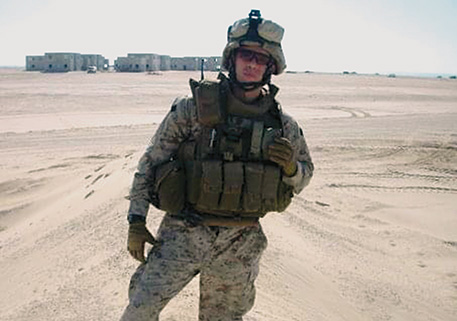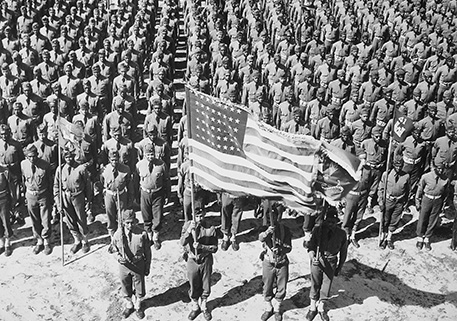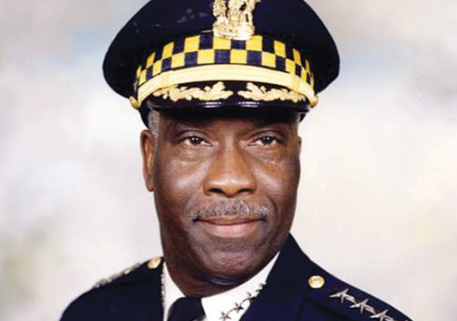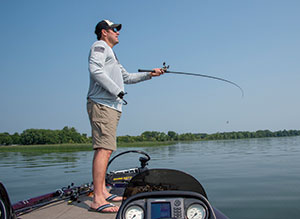 On Sept. 11, 2001, Mike McElhiney and the rest of his Special Forces team knew they’d be headed directly into harm’s way in response to the terrorist attack that claimed nearly 3,000 lives in New York City, the Pentagon and a field in Pennsylvania.
On Sept. 11, 2001, Mike McElhiney and the rest of his Special Forces team knew they’d be headed directly into harm’s way in response to the terrorist attack that claimed nearly 3,000 lives in New York City, the Pentagon and a field in Pennsylvania.
In the weeks following 9/11, the elite soldiers deployed to Afghanistan to conduct irregular warfare and track down Taliban and al-Qaida leaders. McElhiney’s team, Operational Detachment Alpha (ODA) 574, was tasked to take on the enemy just outside the southern city of Kandahar.
“It was just chaos,” said McElhiney.
In addition to assaulting and defending key terrain, ODA 574—part of 3rd Battalion, 5th Special Forces Group (Airborne)—was selected to escort back to Afghanistan a relatively unknown ousted diplomat, Hamid Karzai, who would serve as the war-torn country’s president from December 2001 to 2014.
However, McElhiney’s deployment was cut short in early December 2001 when an American bomb was mistakenly dropped on his position, killing three of his fellow Green Berets—Master Sgt. Jefferson Donald, Sgt. 1st Class Daniel Henry Petithory and Staff Sgt. Brian Cody Prosser—in addition to five friendly Afghan fighters.
Nearly two dozen Special Forces soldiers and 18 Afghans were injured along with McElhiney while fighting the Taliban and al-Qaida. The Joint Direct Attack Munition (JDAM), a single satellite-guided bomb weighing 2,000 pounds, struck their position by accident after a new piece of equipment malfunctioned.
“I was about 40 meters away from where the bomb impacted,” recalled McElhiney. “I remember the red flash, and I remember coming to and trying to triage myself.”
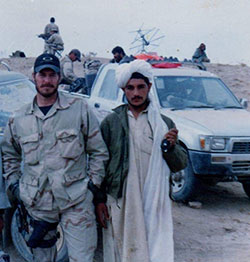

The sheer force of the explosion caused life-threatening injuries. He had a hole in his torso, known as a sucking chest wound; a compound fracture in his left arm; and no initial feeling below his waist. McElhiney also noticed that his right thumb touched his arm’s crease, indicating a severe trauma.
There were many firsts for him while in recovery immediately following the tragedy.
In Germany, he woke up to learn his right arm was gone. McElhiney also spotted golf ball-sized wounds in his legs. At Walter Reed Army Medical Center, he realized he was the beginning of a long chain of injured veterans to be wounded after 9/11.
“When we first got to Walter Reed, we were the only show in town,” he said. “We were the new young set of heroes, and everybody was there to help and support us.”
During his recovery at Fort Campbell, Kentucky, he got his first taste of veteran advocacy. While McElhiney was already equipped with a state-of-the-art prosthesis, he noticed a younger soldier with a similar injury who had a rudimentary hook as his only artificial arm.
“I’ve seen what these [prostheses] can do, and this guy’s here stuck with the hook,” recalled McElhiney. “It didn’t seem like there was a lot of good advocacy or anyone really taking care of him.”
He provided the soldier with the resources that were extended to him, such as numbers for congressional offices and other points of contact.
“I said, ‘Call. They’re waiting to hear from you,’” he said.
That was just the start and a preview of what was to come.
The Army Special Forces motto is “de oppresso liber,” Latin for “to free the oppressed.” Green Berets are trained to fight for those who can’t fight for themselves and assist others in their pursuit of freedom. It’s that ingrained ethos from years within the highly exclusive profession that McElhiney credits for his passion to not settle for the status quo.
Retiring in 2010 after 21 years in the Army, he settled in Minnesota, where he would become instrumental in unequivocally affecting veterans statewide. Larry Herke, the commissioner of the Department of Veterans Affairs for the state of Minnesota, has witnessed firsthand the impact McElhiney has made.
“Mike brings a wealth of knowledge about veterans issues because of his lived experience through the VA system,” said Herke, a DAV life member. “He’s a great depository of information, and he knows how to navigate a lot of the systems that many of our veterans are challenged with.”
McElhiney, the current chief of staff to the Minnesota Department of Veterans Affairs, previously served as the department’s legislative director, a position through which he was heavily involved in crafting important legislation and testifying to the Minnesota Legislature, conveying the realities veterans face.
One of McElhiney’s most notable achievements was part of a multiyear effort, beginning in 2015, to establish three new veterans homes in Minnesota, securing state planning and federal funding. Thanks in part to McElhiney’s advocacy, the Minnesota Legislature set aside $32 million, representing 35% of the total required backing. The other $80 million will be covered by the U.S. Department of Veterans Affairs.
Construction on the new homes, which will provide additional long-term care to veterans, will begin this fall. Five other veterans homes in the state have also been upgraded.
In more recent years, he was involved in establishing a program financed by the sales of the state’s “Support Our Troops” license plates, which fund grants to groups aligned with supporting and improving the lives of veterans and their families. Until the COVID-19 pandemic, entities could apply for funding from $1,000 to $100,000.
During the pandemic, the department launched two other grants: one worth $1,000 for veterans or their family members who suffered a loss of income due to COVID-19 and one for special need up to $3,000. Altogether, the state has dispersed $6.2 million in pandemic grants. McElhiney was involved in establishing the eligibility requirements that have helped so many, said Herke.
But Herke said one of the most significant impacts McElhiney has had is setting a positive example of what is possible even after a serious injury.
“Mike demonstrates every day that you can come back and have a meaningful life—and he wants to help others,” he added. “I think that’s what drives him, both as a past legislative director and current chief of staff. A lot of people are inspired by his story and what he’s done.”
That sentiment is shared by DAV Department of Minnesota Benefits Protection Team Leader Trent Dilks, who has known McElhiney, a member of DAV Chapter 28 in Rochester, for seven years.
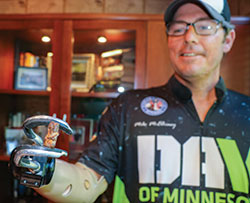

“He is somebody showing you can keep doing these awe-inspiring things,” said Dilks. “There are barriers to being a wounded veteran, for sure, but Mike is living proof you can overcome them.”
McElhiney, an avid outdoorsman and a top-notch angler, according to Dilks, has helped to lead the charge on trying to increase access to hunting and fishing opportunities for veterans by advocating for reduced fees for state licenses.
Dilks also said he’s helped to drive crucial funding to the DAV Department of Minnesota by introducing DAV to Bob Lange, an entrepreneur who was looking to use his influence and private estate in Glenwood to support those who’ve served.
“I wanted to put something together for veterans for outdoors that would be impactful but also treat disabled veterans right, but I didn’t know where to turn,” said Lange, who owns several businesses, including an insurance brokerage company and hotel.
That’s where McElhiney came in, recommending DAV. Prior to COVID-19, annual fundraisers were held at Lange’s home, the first of which raised $250,000 for the Department of Minnesota’s outdoor excursions.
Lange credits the success of his events—as well as the substantial generosity of his customers, with more than $1 million raised to support the state’s DAV and other veteran-related causes—to McElhiney.
“All of this could not have happened if Mike hadn’t gone out and done the work he did,” Lange added. “Mike is one of those guys who pulls so many strings in the background that things kind of just happen.”
Despite all of this, McElhiney remains a humble servant to his fellow veterans.
“I can’t take credit for everything,” he said. “I just played my role, just like anyone in my position would hopefully do. This is really about all of the stakeholders, the veteran organizations, the legislature, the governor’s office—we’re all part of that mix of making attempts to come to fruition.”
“Impressed doesn’t begin to describe how other veterans and I across Minnesota feel about Mike and the immense impact he’s had,” said Minnesota native and National Commander Butch Whitehead. “Mike brings a new meaning to what it means to serve veterans.”

